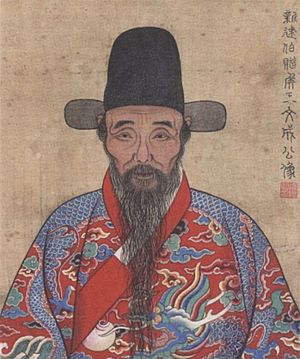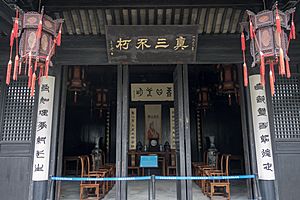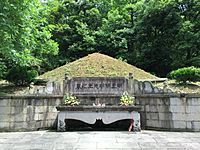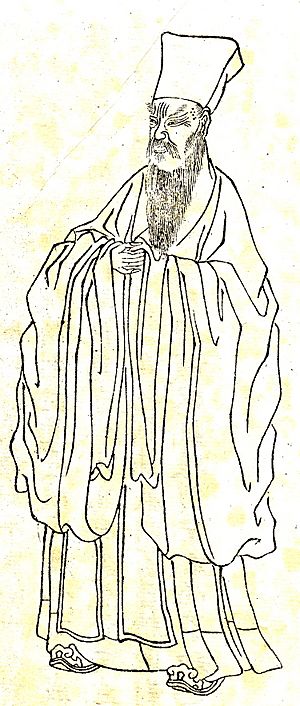Wang Yangming facts for kids
Quick facts for kids
Wang Shouren
|
|||||||||||||
|---|---|---|---|---|---|---|---|---|---|---|---|---|---|
 |
|||||||||||||
| Viceroy of Liangguang | |||||||||||||
| In office 1527–1529 |
|||||||||||||
| Preceded by | Yao Mo | ||||||||||||
| Succeeded by | Zhang Jing | ||||||||||||
| Minister of War in the Southern Capital | |||||||||||||
| In office 1521–1527 |
|||||||||||||
| Grand coordinator of Nangan | |||||||||||||
| In office 1472–1529 |
|||||||||||||
| Preceded by | Wen Sen | ||||||||||||
| Succeeded by | Nie Xian | ||||||||||||
| Personal details | |||||||||||||
| Born | 26 October 1472 Yuyao, Zhejiang |
||||||||||||
| Died | 9 January 1529 (aged 56) Nan'an fu, Jiangxi (present-day Ganzhou) |
||||||||||||
| Spouse | Lady Zhu | ||||||||||||
| Occupation | Calligrapher, military general, philosopher, politician, and writer | ||||||||||||
|
Philosophy career |
|||||||||||||
| School | Confucianism | ||||||||||||
|
Notable ideas
|
Yangmingism, Unity of knowledge and action | ||||||||||||
|
Influences
|
|||||||||||||
|
Influenced
|
|||||||||||||
| Chinese name | |||||||||||||
| Traditional Chinese | 王陽明 | ||||||||||||
| Simplified Chinese | 王阳明 | ||||||||||||
|
|||||||||||||
| Shouren (given name) |
|||||||||||||
| Chinese | 守仁 | ||||||||||||
|
|||||||||||||
| Bo'an (courtesy name) |
|||||||||||||
| Chinese | 伯安 | ||||||||||||
|
|||||||||||||
| Yangmingzi (art name) |
|||||||||||||
| Traditional Chinese | 陽明子 | ||||||||||||
| Simplified Chinese | 阳明子 | ||||||||||||
|
|||||||||||||
| Wencheng (posthumous name) |
|||||||||||||
| Chinese | 文成 | ||||||||||||
|
|||||||||||||
| Earl of Xinjian (nobility title) |
|||||||||||||
| Chinese | 新建伯 | ||||||||||||
|
|||||||||||||
Wang Yangming (born Wang Shouren, 26 October 1472 – 9 January 1529) was a very important Chinese thinker. He was a skilled calligrapher, a military general, a philosopher, a politician, and a writer. He lived during the Ming dynasty in China.
Many people consider him one of the most important thinkers after Zhu Xi. Wang Yangming's ideas changed how people understood Confucianism. He believed that knowledge and action were connected, which was different from other thinkers at the time. He and another philosopher, Lu Jiuyuan, started a way of thinking called the School of the Mind.
In many countries like China, Japan, and Western nations, he is known by his special honorific name, Wang Yangming.
Contents
Life and Achievements
Wang Yangming was born in Yuyao, a city in Zhejiang Province, China. His family was known for being scholars and serving in the government. His father, Wang Hua, was very smart and became the top student in the Imperial Examination in 1481. He later became a high-ranking official.
Wang Yangming also did very well in the Imperial Examinations. He earned his juren degree in 1492 and his jinshi degree in 1499. These were important tests to become a government official. He worked in different government jobs. Later, he became the Governor of Jiangxi province.
Military Leadership
Wang Yangming was a very successful general. He was known for making sure his soldiers followed strict rules. In 1517 and 1518, he was sent to stop peasant revolts in areas like Jiangxi, Fujian, and Guangdong.
He cared about the damage caused by war. He asked the government to offer forgiveness to the rebels. He was able to defeat the rebel armies and bring peace.
Stopping the Prince of Ning's Rebellion
In 1519, while he was the governor of Jiangxi, Wang Yangming faced a big challenge. A powerful noble, Zhu Chenhao, who was the fourth Prince of Ning, started a rebellion. The prince's main base was in Nanchang. From there, he could sail down the Yangtze River and attack Nanjing, which was an important southern capital.
Wang Yangming quickly got ready for battle to stop the prince. He also used clever tricks to make the prince think that many armies were surrounding him. This made the prince hesitate, which gave Nanjing more time to prepare its defenses. In the end, the Prince of Ning had to fight the government forces and was defeated and captured.
During this fight, Wang Yangming also mentioned using a new type of weapon called the fo-lang-ji. This was a breech-loading culverin cannon that came from the Portuguese traders who had recently arrived in China.
As governor of Jiangxi, he also helped rebuild the areas affected by the rebellion. He built schools and helped the former rebels get their lives back on track. Even though he was made an earl for his success, some people didn't like him because his ideas were different from the famous philosopher Zhu Xi.
Many years after he died, he was given high honors. In 1584, he was honored in the Confucian Temple. This was the highest honor a scholar could receive.
Wang Yangming's Philosophy
Wang Yangming was a main leader in the Neo-Confucian School of Heart. This school was started by Lu Jiuyuan. This way of thinking focused on connecting knowledge with action. Another popular school, the School of Principle, believed that you first gain knowledge, and then you use it to guide your actions.
Innate Knowing
Wang Yangming developed an idea called innate knowing. He believed that every person is born with an inner sense of what is right and wrong. He said this knowledge is something you feel naturally, not something you figure out with logic.
These new ideas influenced thinkers in Japan, like Motoori Norinaga. Wang Yangming's school of thought also greatly shaped the samurai code of honor in Japan.
Connecting Knowledge and Action
Wang Yangming disagreed with the idea that you could have knowledge without putting it into action. He believed that you gain true knowledge only by doing things. For him, knowledge and action were always connected. If you learned something and then tried to apply it later, he thought that wasn't true knowledge. He believed that knowing and doing happened at the same time.
The Mind and the World
Wang Yangming thought that objects don't exist completely separate from our mind. He believed that our mind helps to shape how we see and understand things. He felt that the mind gives meaning to the world, not the other way around. So, for him, the mind is the source of all understanding. He saw this as an inner light, a natural goodness and understanding of what is right.
To get rid of selfish desires that can cloud the mind, he suggested a type of meditation. This practice is sometimes called "tranquil repose" or "sitting still" (靜坐 jingzuo). It is similar to Zen meditation in Buddhism.
Influence and Legacy
Wang Yangming is considered one of the greatest masters of Confucianism in history, alongside Confucius, Mencius, and Zhu Xi.
He started the "Yaojiang School" or "Yangming School of Mind." This became one of the most important Confucian schools in China during the mid-late Ming and Qing periods. Many famous thinkers followed his ideas. Wang Yangming's ideas became very popular and important in China during the late Ming period.
His ideas have continued to influence China even in modern times. For example, a Chinese warlord named Yan Xishan tried to bring back Confucianism in his region based on Wang's philosophy.
Wang Yangming's teachings also inspired many reformers and revolutionaries in Japan during the 1800s. This led to a lot of interest in his ideas in Japan. Many Chinese and Korean thinkers believed that Wang Yangming's teachings strongly influenced the development of modern bushido (the "way of the warrior") in Japan. They promoted his ideas to make their own people stronger.
The Japanese Admiral Tōgō Heihachirō, who was famous during the Russo-Japanese War, was influenced by Wang Yangming. He even had a stamp that said, "One's whole life followed the example of Yangming." In Japan, many scholars and politicians followed Wang Yangming's school of thought.
Memorials and Tributes
Chiang Kai-shek, a famous leader, named a national park in Taiwan, Yangmingshan, after Wang Yangming. A road in Nanchang is also named Yangming Road in his honor. Additionally, National Yang-Ming University in Taiwan is named after him.
In Guiyang, the capital of Guizhou Province, there is a statue of Wang Yangming, as well as a museum and a theme park dedicated to him. There's even a robot version of Wang Yangming in the city!
In his hometown of Yuyao, Zhejiang Province, the city government named a middle school after his honorific name.
See also
 In Spanish: Wang Yangming para niños
In Spanish: Wang Yangming para niños
- Tu Wei-Ming
- Huo Long Jing
 | Jessica Watkins |
 | Robert Henry Lawrence Jr. |
 | Mae Jemison |
 | Sian Proctor |
 | Guion Bluford |




